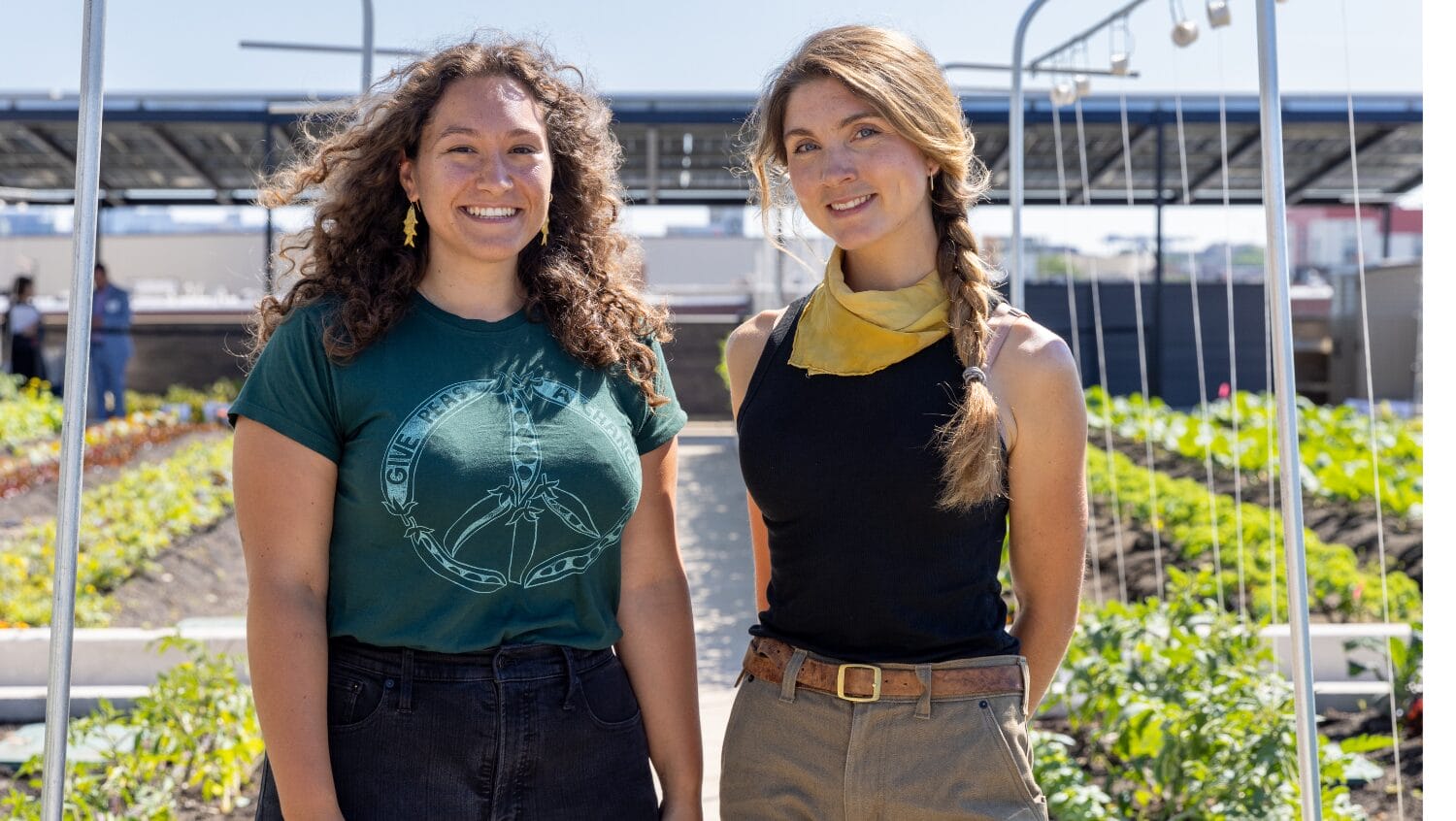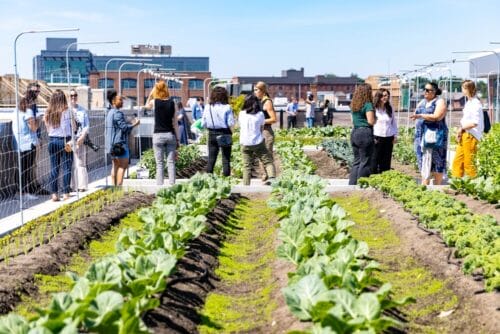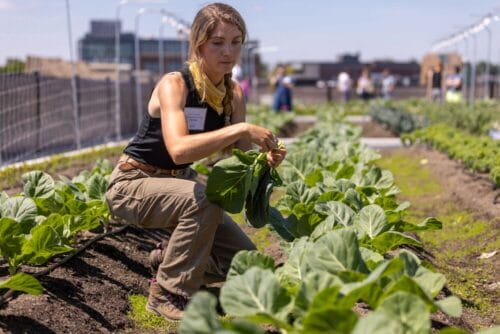Farming the Boston Skyline: BMCHS Grows Sustainability Efforts Through a New Rooftop Farm
June 13, 2024
By Meryl Bailey

Boston Medical Center
(from left to right) Farm education and community outreach coordinator Olivia Grieco and rooftop farm manager Sarah Hastings pose on the roof of Boston Medical Center Health System's new farm at 960 Mass Ave.
The health system’s second rooftop farm will provide fresh crops for the neighborhoods surrounding Boston Medical Center's main campus.
Taking a brief rest from harvesting a crate of radishes, farmer Sarah Hastings gazes up at the Boston skyline. The view is a constant reminder that her farm sits atop a three-story power plant on Albany Street in the city’s South End. In 2016, as part of its commitment to community health and environmental sustainability, Boston Medical Center Health System (BMCHS) undertook a radical reimagining of “food as medicine,” working with the company Recover Green Roofs to replace an expanse of barren roofing on campus with rows of soil-filled milk crates. The result was a first-of-its-kind hospital rooftop farm — Power Plant Farm — yielding significant benefits — not only growing 5,000 pounds of organic fruits, vegetables, and herbs annually for BMCHS patients — but also fostering community conversation, reducing the health system’s carbon footprint, and helping to mitigate the warming climate in its neighborhood.
Now, BMCHS is expanding this vision by adding 4,915 feet of growing space to the roof of one of their office buildings on 960 Mass Ave aptly named Newmarket Farm.
Breaking ground for Newmarket Farm
Newmarket Farm sits on top of a three-story building at the intersection of the South End, Dorchester, and Roxbury neighborhoods in South Boston’s Newmarket district. The farm’s concrete raised beds form long, uninterrupted rows of crops with accessible walkways between them. The walkways are seeded with micro-clover, a nitrogen-fixing legume, to help boost the soil fertility and structure of the farm. In this new location, BMCHS keeps pushing the frontier of what is possible. Spring of 2024 begins the first growing season and a year of experimentation in improving crop production through new varieties, trellising methods, on-demand drip irrigation, and row covers that will extend the growing season.

Newmarket Farm, Boston Medical Center Health System’s newest rooftop farm sits atop a three-story office building in Boston’s Newmarket District (Boston Medical Center).
“Green roofs have been a feature of sustainable urban design, but they are almost exclusively made of sod or a variety of perennial crops. Producing high-yield leafy vegetables and fruiting crops on a roof is still not well established,” explains Hastings, BMCHS’s rooftop farm manager. “At both Newmarket Farm and Power Plant Farm, we are working to develop efficient systems to optimize nutrients to the crops and to enable them to produce a lot of food with the hope that we can share our successful model with others.”
Newmarket Farm promises to double yields, producing enough harvest to further sustain the BMCHS community and be donated twice weekly to several South End non-profits and community centers. The location also expands BMCHS’s reach into the surrounding community to further engage community members in learning to grow and cook healthy food.
“We are working to make Newmarket Farm a community tool and a community space. Our goal is to share our knowledge to help people do this in their own apartments and on their own balconies,” emphasizes Olivia Grieco, BMCHS’s farm education and community outreach coordinator.
The BMCHS Rooftop Farm regularly hosts visitors and conducts educational workshops. Students from Boston Public Schools, members of local community organizations, as well as staff and patients from hospital departments regularly come to learn about the environmental benefits of rooftop farming and get hands-on training on vegetable container gardening. Newmarket Farm adds 1,220 square feet of open space protected by a shaded pergola. It provides more opportunities for community groups to gather, participate in classes, and enjoy the farm.
“GrowBoston, the City of Boston’s Office of Urban Agriculture; Stop & Shop; and Citizens provided essential support that made BMC’s second rooftop farm possible,” said Bob Biggio, Senior Vice President and Chief Sustainability & Real Estate Officer at BMCHS. “Support from our government and philanthropic partners is critical for programs like these that fall outside of traditional medicine and insurance reimbursements.”
An oasis in a food desert
Crushing costs and food deserts continue to be a challenge in Boston’s historically marginalized communities, limiting access to healthy food. The broken food system has led to health inequities, increasing the incidence of obesity, diabetes, heart disease, and other chronic conditions. For seven years, Power Plant Farm has fueled the hospital’s innovative network of services to improve food security and health. The farm’s hyper-local, fresh produce is distributed weekly to the health system’s Preventive Food Pantry, which serves 7,000 individuals and families monthly, and the Teaching Kitchen, where patients learn to prepare and cook healthy meals. It also is distributed through the hospital’s cafeteria system and directly onto patients’ plates. Now, in a collaborative effort with Boston Area Gleaners, the impact of Newmarket Farm will extend fresh vegetables, leafy greens, and herbs further into the community — starting next year, the non-profit plans to make twice-weekly deliveries to shelters and community centers located in the South End. For now, the BMCHS rooftop farm team is delivering the fresh produce to the community using their own van.
“We are working to make Newmarket Farm a community tool and a community space. Our goal is to share our knowledge to help people do this in their own apartments and on their own balconies.”
The farms also focus on cultivating hard-to-find produce that racially diverse communities will recognize and value. The farm grows peppers like aji dulce, which is popular in Caribbean countries and Latin America and Malabar spinach, a nutrient-dense, vining green found in many Indian, African, and Asian cuisines. Callaloo greens, tulsi basil, bok choy, napa cabbage, cranberry beans, and Japanese turnips are other hard-to-find ingredients that are culturally relevant to the communities of South Boston.
Sustainability is healthcare
Environmental preservation is intrinsic to community health. The average vegetable travels 1,500 to 2,000 miles from the farm to the family table. By growing a large portion of the hospital’s produce on-site, BMCHS slashes those miles into mere feet, reducing carbon emissions from shipping. As New England summers grow increasingly warmer, the BMCHS green rooftops also help mitigate the harsh heat-island effect of urban pavement. The lush green space creates a micro-climate that deflects sunlight and releases needed moisture into the environment while absorbing stormwater runoff.

BMCHS farmer Sarah Hastings tending to crops at Newmarket Farm (Boston Medical Center).
With an eye toward the future, BMCHS aims to reduce its carbon footprint to net zero before 2050. The hospital’s rooftop farms are an integral and inspiring way to achieve those goals, and the hope is that other institutions will follow suit.
“It’s not just about the yield of the produce but about trying to engage as many people and inspire and share as much knowledge as possible,” says Hastings.


